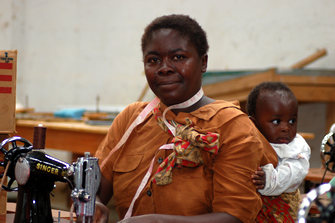Family Preservation Initiative for income security

The Family Preservation Initiative (FPI) provides income generating programs to help HIV-positive patients and their families get back on their feet. Providing anti-retroviral drugs and support for their safe administration is the core of HIV treatment, but much more is needed. The majority of patients cared for by AMPATH are among the poorest in the world. Many have lost their spouse. Though sick themselves and lacking basic human necessities, most patients remain the sole support for multiple vulnerable children. If these patients are to escape perpetual dependence on the donor community, comprehensive care must take on a whole new meaning and sense of urgency. Most of the patients presenting to FPI are single, widowed mothers, unable to pay their rent or feed their family adequately, or with serious domestic issues threatening the security of themselves and their families. The goal of the Family Preservation Initiative is to give assistance without encouraging dependency through offering income-generating programs.
FPI is the economic security program of the Academic Model for Providing Access to Healthcare (AMPATH). FPI provides services in three key areas:
- Capacity-building services: Programs in the capacity-building arena include business and agricultural training courses, business and agricultural consultancy, and microfinance
- FPI-managed enterprises: Enterprises FPI actively maintains and manages include Imani Workshop, Cool Stream Restaurant, and the Amkatwende Agricultural Co-operative
- FPI pilot and value-add programs: FPI farms (5 sites), poultry feed and egg production, and food processing FPI is currently offering services in ten sites.
FPI has partnered with the Purdue University Food and Income Security in the face of HIV/AIDS (FISH) program to develop agricultural outreach services. The general objective of FISH is to improve the food and income security of AMPATH HIV/AIDS patients. This will be accomplished by developing a “toolkit” of proven agricultural techniques and enterprises for use by AMPATH patients.
Back to AMPATH or IU-Kenya Partnership main page
Adapted with permission from the IU Kenya website, February 2009.